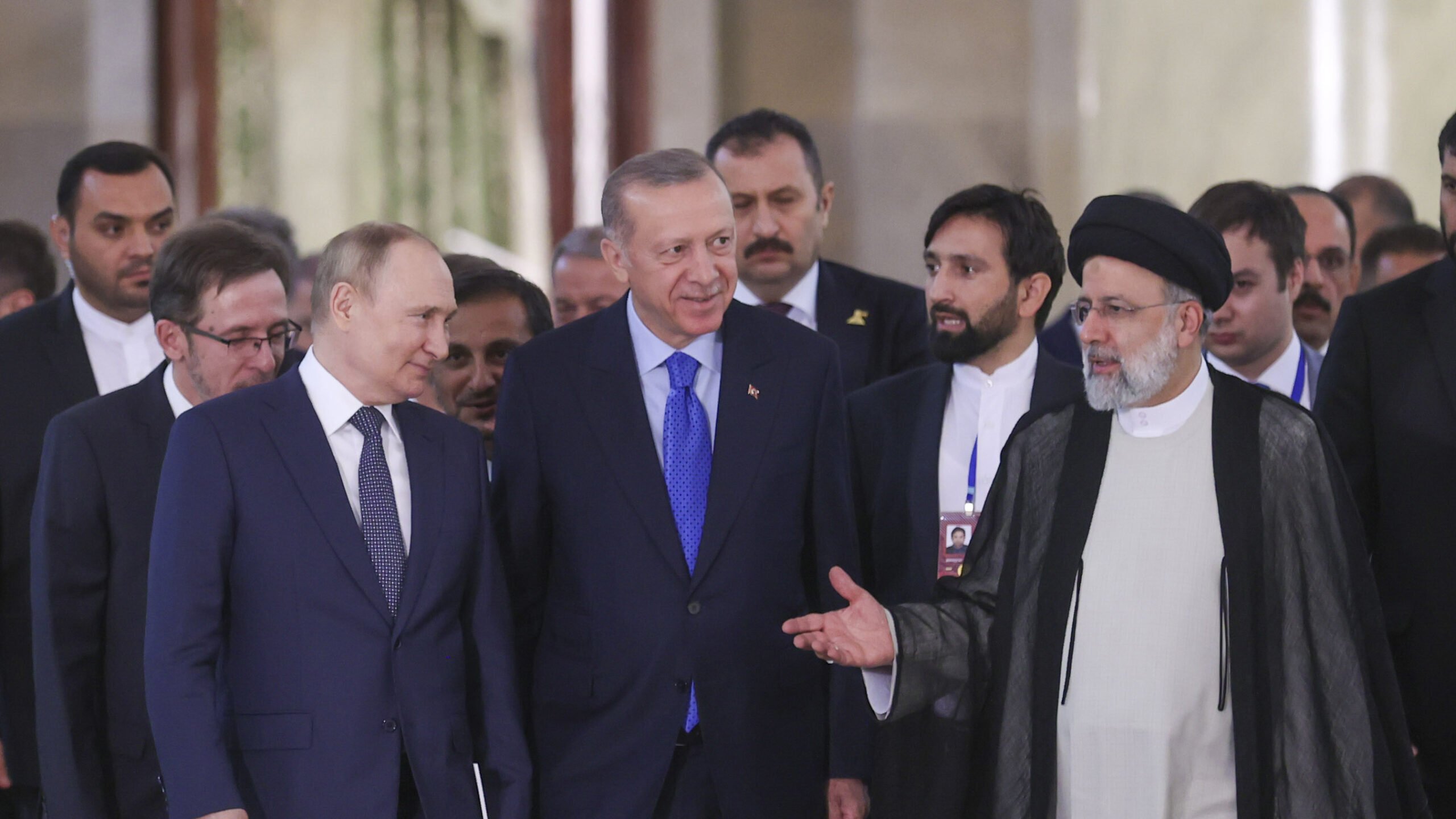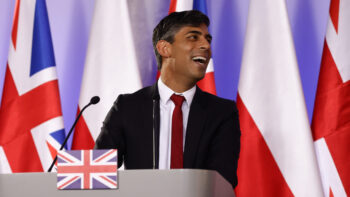
Turkish President Recep Tayyip Erdogan (C), Iranian President Ebrahim Raisi (R) and Russian President Vladimir Putin (L) arrive to hold a joint tripartite news conference after the 7th summit in Astana format in Tehran, Iran on July 19, 2022. (Mustafa Kamaci/Anadolu Agency via Getty Images)
TEL AVIV — As the White House sounds the alarm about Russia’s use of Iranian drones in deadly attacks in Ukraine, Iran’s greatest adversary in the Middle East, Israel, is warily eyeing the evolving relationship between Moscow and Tehran, and trying to predict what it means for the region.
According to analysts and sources here, there’s concern that Iran could reap concrete rewards in the short term and could strengthen its strategic hand long into the future.
For its part, Iran has denied that it’s supplying the weapons to Russia, an argument that’s failed to convince American and European officials. In a statement to Politico, which also reported some of the benefits Iran may expect to see, White House National Security Council spokesperson John Kirby said Iran’s aiding of Russia was “just another example of Iran’s desire to export violence, and both Iran and Russia need to be held accountable for it.”
But as with everything in the Middle East, it’s not that simple. Here are some areas of key concern, according to the Israeli analysts and sources.
Short Term: Drone Experience, Help In Syria, Warnings In Azerbaijan
Perhaps the quickest reward for Iran’s help in supplying drones to Russia will be the simple fact of being able to see them perform in a live combat situation, an Israeli military source told Breaking Defense. The US military has made no secret that it’s been learning lesson after lesson about weapons systems and tactics from watching the Ukraine conflict, and there’s no reason Iranian military commanders wouldn’t do the same.
Late last week Kirby told reporters “Iranian military personnel” were on the ground in Crimea to “assist Russia” in UAV operations, giving them a front row seat.
Retired Israeli Brig. Gen. Amos Gilead told Breaking Defense, “The Iranians gain experience in operating their armed UAVs while they are operated in Ukraine. They are operating alongside the Russians and learn a lot.”
Israel has already dealt with suspected Iranian drone operations, including in a headline-grabbing operation last year in which Israeli F-35s shot down two Iranian drones in what’s believed to be the F-35’s first air-to-air kill. But so far, it’s been in a limited capacity and nothing like the numbers seen in Ukraine.
One area of intense observation from Israel is whether, at Iran’s request, Russia changes its stance toward Syria. One of the reasons Israel so far has not supported Ukraine has been that so far, Russia has allowed Israel to operate with a relatively free hand in Syria, where Jerusalem strikes suspected Iranian proxy targets and weapons shipments. Israel doesn’t want to rock the boat, but an Israeli intelligence expert said it’s possible that now Tehran has enough leverage to force Russia’s hand.
Northeast of Syria, Iran already appears to be flexing some military muscle on the border with Azerbaijan. Last week Iran’s Islamic Revolutionary Guard Corps began conducting the exercises, which included practicing the construction of a bridge over the Arax River, which serves as part of the border between the two states. Israel has supported Azerbaijan in previous conflicts with its neighbor Armenia, which was supported by Iran and Russia.
RELATED: Azerbaijan-Armenia conflict could impact the Israeli-Russian relationship
Defense sources said Azerbaijan is currently seeking more defense systems from Israel, but now it’s unclear if Russia would act against any deals.
Ukrainian President Volodymyr Zelensky has his own theory about what Iran is getting in return for its help.
“I have a question for you: How does Russia pay Iran for this, in your opinion? Is Iran just interested in money? Probably not money at all, but Russian assistance for the Iranian nuclear program,” the leader said today in a video message to an Israeli conference. “Probably, this is exactly the meaning of their alliance.”
Long Term: Shifting Relationships, Lasting Antagonism
Regardless of how the short term plays out, Russia’s new dependence on Iran is likely to strengthen the relationship between the two countries for years to come.
Last month, when Iranian President Ebrahim Raisi met with Russian President Vladimir Putin in Uzbekistan, he said their cooperation in the face of US sanctions would make both countries “stronger.”
“The relationship between countries that are sanctioned by the US, such as Iran, Russia or other countries, can overcome many problems and issues and make them stronger,” Raisi said, according to AFP. “The Americans think whichever country they impose sanctions on, it will be stopped. Their perception is a wrong one.”
The two were meeting in Samarkand as part of the Shanghai Cooperation Organization, a group to which Iran has applied for full membership to join Russia, China, India and a number of central Asian nations. The US is not a party to the SCO.
Israeli sources here said that Raisi and his government consider relations with Moscow and Beijing and Iran’s full membership in the SCO a powerful tool in overcoming US sanctions that have hugely affected the Iranian economy since 2018 when then-US President Donald Trump pulled out of the 2015 nuclear agreement (JCPOA).
At the time of the SCO meeting in mid-September, Putin reportedly said work on a major treaty of strategic ties between Iran and Russia was nearly completed, and that commercial ties would follow.
“Interregional ties are developing. We actively cooperate on the international arena and on many [points] our positions are close, or, as diplomats say, coincide,” Putin said.
Lockheed Martin projects potential $1 billion loss on classified program
Lockheed CFO Jay Malave said the company currently expects the program to become profitable on an annual basis around the 2028 timeframe.


























